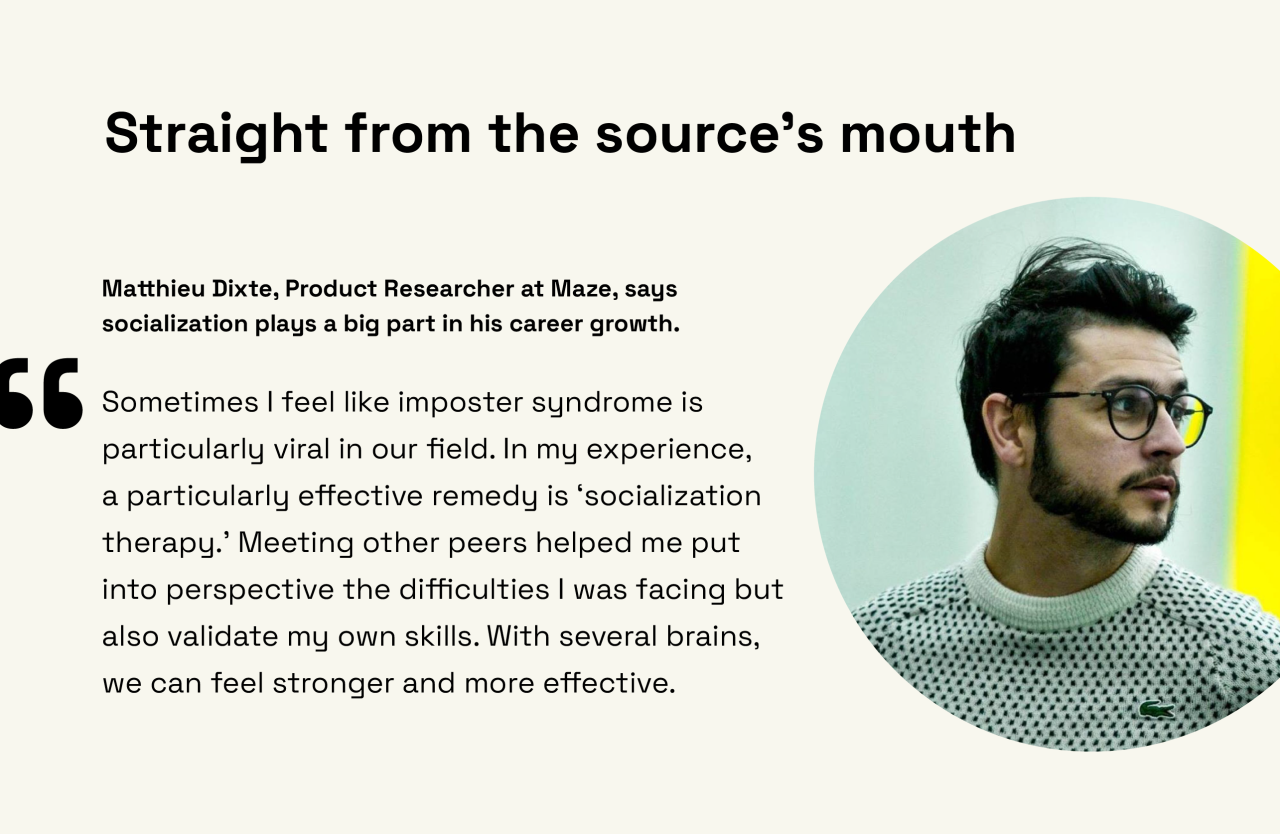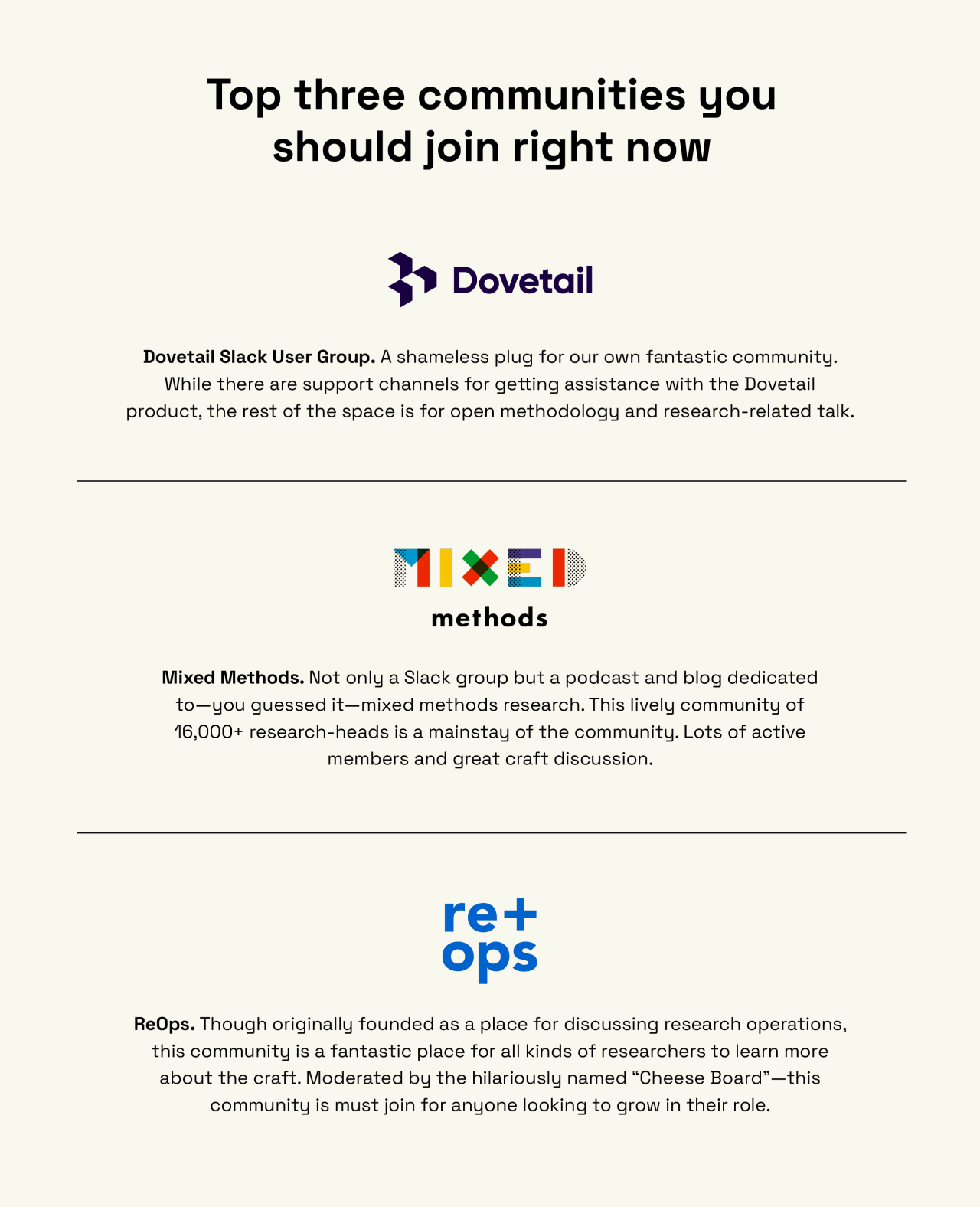Are you getting the most out of the research community?
A friend in need is a friend indeed.
Interest in research is exploding—and everyone from all backgrounds wants to learn more. Follow these tips and get the most out of the community.
Whether you’re a current or aspiring user researcher or a product professional who sometimes does research—you’ve probably noticed the online research community has exploded lately. There are a ton of both curious and talented professionals who are very ready to chat research and are often generous with their time.
That said, sometimes it’s difficult to figure out how to utilize the community when you find yourself in a position where you could use help and advice. Let’s look at the difficulties in harnessing the power of the community and what to do about it.
What’s difficult about using the research community when you need help?
When doing user research, there are plenty of best practices and industry standards to rely on. However, no matter how diligent you are in informing yourself or how much experience you have, studying humanity for a living is full of surprises.
Surprises can come from budget constraints, insane timelines, unexpected results, stakeholder problems, or other unique circumstances. We’re all researching in an environment with its own unique business and mission, but also varying budgets, attitudes toward user research by management, organizational structures, and so on.
When you’re looking for advice by crowdsourcing a solution, you’ll often find other researchers appear to miss the mark or offer advice that doesn’t suit your particular situation.
Similarly, theoretical information is accessible on various blogs and websites, but practical advice is much harder to find.
Once you’re beyond the basics, like how to build rapport during user interviews or the pros and cons of various participant recruiting tools, the reality is that many areas where you’ll need help involve a lot of internal knowledge and professional judgment.
Another barrier to leaning on the community when you need help is the fear of outing yourself as not knowing something in a small, tight-knit community.
Deep down, many of us are afraid crowdsourcing research answers could reflect poorly on our abilities as a researcher. Is it possible that the person who answers me today will be the hiring manager interviewing me later?

Matthieu Bixte, Product Researcher, Maze.
All of these challenges can only mean one thing: most of us probably aren’t utilizing the power of the research community to its fullest potential—and that’s a shame.
Three strategies for using the community to learn and grow
Here are three tried and tested methods for getting the most out of the research community. Whether you’re a full-time researcher or someone who does research like a designer or product manager, follow these steps and you’ll become a pro in no time.
Invest heavily in one-on-one relationships within the community
When you find someone else who does user research, perhaps in a similar organization or background, nurture those relationships one-on-one.
Whether it’s in a Slack channel, on LinkedIn, or at a local meetup—don’t be shy. Approach others in the community and suggest a virtual or face-to-face coffee.
Here’s why this matters: generally speaking, you can read up on the basics. You’re much more likely to get inspiration and tactical, strategic insight when you have other researchers or PwDR (people who do research) with whom you can have a nuanced conversation.

The best Slack user groups to jump in and join right now. Links in footnote at the end of the article.
Investing in these relationships is a great way to foster a mutually beneficial arrangement. You can both make yourselves available to discuss each other’s questions and predicaments. Not only that, but you don’t have to worry about privacy or any of your other crowdsourcing concerns.
I’ve initiated around a dozen virtual and face-to-face coffees with researchers I didn’t know personally, and I have yet to be turned down. Don’t be shy about sending that message on LinkedIn or exchanging numbers with someone at your local UXR meetup—it pays off.
When you do crowdsource, tell the crowd who and what you need
When I started my first full-time role as a UXR, I remember asking for advice about the pros and cons of two usability testing platforms on a LinkedIn UXR community. The responses often lacked context. For example, a bunch of people said, “XYZ all the way!” and indicated their preference.
Even those who gave a bit more reasoning behind their preferences could only be helpful in a limited way because they lacked the context in which they worked. Over time, I realized that when you crowdsource, people guess what you want to know based on what you wrote.
To be sure, there is sometimes incredible benefit in asking a lot of researchers in one place for their thoughts, insights, and advice—particularly when your question isn’t super detailed or specific to your precise situation. But if you crowdsource, be explicit with what you need. Here’s a handy guide to help you do just that.

Your handy guide to crowdsourcing on social media.
In general, many of us ask questions of others in the research community in a “quick post,” but putting some thought into what you write makes it much more likely you’ll get real, actionable advice.
Positioning yourself as a learner isn’t necessarily a bad thing when it comes to your career prospects
I hear and have personally experienced the fear of coming across as lacking in knowledge in front of the community. If you’re a senior UX researcher lacking a fundamental skill, perhaps it’s warranted. But for the most part, doing user research is complex, and most of us need advice or additional perspectives throughout our day-to-day work.
As a member of the UXR community, I like to think about asking for quality advice and insights in a public forum as positioning myself as a learner. As someone who leads a user research team, I recognize the value of hiring employees who know what they don’t know and utilize the resources available to them to learn.
Learn to challenge that nagging feeling that you shouldn’t ask questions in public forums—it may be preventing you from getting extra value from the research community.
Overall, we all have much to gain by putting some strategic thought into how we interact with the community. Being specific about what we want to learn, investing in one-on-one relationships, and getting comfortable with being a lifelong learner can all help you get the most out of and give back to this talented and generous pool of professionals.
Top three community links
Dovetail Slack user group: Join here
Mixed Methods: Join here
ReOps: Join here
Subscribe to Outlier
Juicy, inspiring content for product-obsessed people. Brought to you by Dovetail.